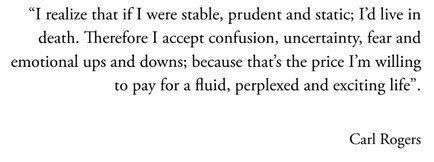- Articles
- Forum Archive
- Psychology, Psychiatry, Psychotherapy, and Health
- Therapy, Therapists, and Self-Help
You are using an out of date browser. It may not display this or other websites correctly.
You should upgrade or use an alternative browser.
You should upgrade or use an alternative browser.
More threads by Daniel E.

 www.psychologytoday.com
www.psychologytoday.com
When therapy is progressing slowly, this does not necessarily mean that you have “unconscious resistances” in the sense that Freud conceived them, or that your brain is working undercover to sabotage you. It also does not mean you are not working hard enough! Therapy is an investment, requiring patience, perseverance, and consistency. Gains are gradual and incremental, but only then can change be long-lasting.

 consumer.healthday.com
consumer.healthday.com
Three-quarters of parents in the poll thought peers could better understand teen challenges, compared to teachers or counselors in the school. The majority also agreed that peer support leaders at school would encourage more teens to talk with someone about their mental health problems.

 www.newharbinger.com
www.newharbinger.com
Our brains seem to know little difference between fear bred from bullets and ill-timed therapist “interpretations.”

Cognitive processes cannot stand equivalent to all psychological processes. It is vital to clarify why a research focus on motivation, human needs, developmental processes, social relationships and contexts is important to any comprehensive model of mental health and care systems. If you thwart an individual’s basic emotional and motivational needs, it has major consequences on how the brain deals with those crises of absence.
~ Paul Gilbert
"When pathological ambivalence is operating, a person's self-talk includes statements such as, 'No one will care for my needs, but I secretly, maybe even unconsciously, crave the experience of being taken care of. Therefore, I need to act in a way that will get you to take care of me. However, I can't believe that you will care for my needs regardless of what you do, so I need to act in a way that shows that I don't care or need you.'"
~ Linda Paulk Buchanan, PhD

 www.lindapaulkbuchanan.com
www.lindapaulkbuchanan.com
"One of the saddest things I encounter in my work as a psychologist is to hear about the painful experiences people have lived through and then watch as they create the same pain in their adulthood due to their early false beliefs."
"Stories we tell ourselves that contain false scripts can produce ambivalence in our lives about how best to get our needs met. Say, for instance, that you want to be married and have a family but you believe that people can't be trusted and will eventually leave. You are experiencing two opposing needs; to have a family and to protect yourself from rejection. Opposing needs will create ambivalence as to how to interact with others. Consequently, the need to protect yourself from rejection creates a guardedness that may actually result in people leaving; this then affirms the belief that people will leave. This is referred to as a self-fulfilling prophecy. Sound confusing? It is and it can have life-crippling effects."
~ Linda Paulk Buchanan, PhD
"Clients want to change, they have the capacity to change and they are doing their best to make change happen."
"I think allowing yourself to be vulnerable is one of the hardest things to do in therapy. The good news is that if you keep working at it, over time you will allow yourself to go there. Don't beat yourself up over this, it is a process, and takes time, for all of us. Have faith in yourself, you will get there."
~ Into The Light
“Through its influence upon the unconscious, music can have a specific healing effect. It can help in eliminating repressions and resistances, and it can bring into the field of waking consciousness many drives, emotions and complexes which were creating difficulties in the unconscious.”
-- Roberto Assagioli
-- Roberto Assagioli

It’s Not You, It’s Your Unconscious
If therapy is moving slowly, it doesn't mean you aren't working hard enough.
When therapy is progressing slowly, this does not necessarily mean that you have “unconscious resistances” in the sense that Freud conceived them, or that your brain is working undercover to sabotage you. It also does not mean you are not working hard enough! Therapy is an investment, requiring patience, perseverance, and consistency. Gains are gradual and incremental, but only then can change be long-lasting.

HealthDay: Information For Healthier Living
Explore HealthDay for comprehensive health topics, latest medical news, and wellness tips. Trusted for accuracy and expertise.
Three-quarters of parents in the poll thought peers could better understand teen challenges, compared to teachers or counselors in the school. The majority also agreed that peer support leaders at school would encourage more teens to talk with someone about their mental health problems.
"Having somebody next to you, even if you don't discuss your problems, is regulatory."
~ Marianna Pogosyan Ph.D.
~ Marianna Pogosyan Ph.D.
“Interrupting our destructive habits and awakening our heart is the work of a lifetime.”
~ Pema Chödrön, The Places that Scare You
~ Pema Chödrön, The Places that Scare You

The Pointless Games We Play With “Difficult” Clients – New Harbinger Publications, Inc
By Mitch Abblett, PhD, author of From Anger to Action Tug-of-war is a silly game; all of that straining in order to move a rope a matter of yards. If
Our brains seem to know little difference between fear bred from bullets and ill-timed therapist “interpretations.”
“People need people - for initial and continued survival, for socialization, for the pursuit of satisfaction. No one - not the dying, not the outcast, not the mighty - transcends the need for human contact.”
“[T]he harvest of psychotherapy is not cure - surely, in our field, that is an illusion - but instead change or growth.”
― Irvin D. Yalom, The Theory and Practice of Group Psychotherapy
“[T]he harvest of psychotherapy is not cure - surely, in our field, that is an illusion - but instead change or growth.”
― Irvin D. Yalom, The Theory and Practice of Group Psychotherapy

Cognitive processes cannot stand equivalent to all psychological processes. It is vital to clarify why a research focus on motivation, human needs, developmental processes, social relationships and contexts is important to any comprehensive model of mental health and care systems. If you thwart an individual’s basic emotional and motivational needs, it has major consequences on how the brain deals with those crises of absence.
~ Paul Gilbert
Last edited:
"When pathological ambivalence is operating, a person's self-talk includes statements such as, 'No one will care for my needs, but I secretly, maybe even unconsciously, crave the experience of being taken care of. Therefore, I need to act in a way that will get you to take care of me. However, I can't believe that you will care for my needs regardless of what you do, so I need to act in a way that shows that I don't care or need you.'"
~ Linda Paulk Buchanan, PhD

I'm Not Good Enough Book | Linda Buchanan PhD
How the Stories You Tell Yourself Are Ruining Your Life. If you are struggling with feelings of insecurity of any kind, it may be that you are being influenced by a "story" that you developed in childhood. This story may have been guiding you, sometimes without your awareness, ever since.
 www.lindapaulkbuchanan.com
www.lindapaulkbuchanan.com
"One of the saddest things I encounter in my work as a psychologist is to hear about the painful experiences people have lived through and then watch as they create the same pain in their adulthood due to their early false beliefs."
"Stories we tell ourselves that contain false scripts can produce ambivalence in our lives about how best to get our needs met. Say, for instance, that you want to be married and have a family but you believe that people can't be trusted and will eventually leave. You are experiencing two opposing needs; to have a family and to protect yourself from rejection. Opposing needs will create ambivalence as to how to interact with others. Consequently, the need to protect yourself from rejection creates a guardedness that may actually result in people leaving; this then affirms the belief that people will leave. This is referred to as a self-fulfilling prophecy. Sound confusing? It is and it can have life-crippling effects."
~ Linda Paulk Buchanan, PhD
Last edited:
"The ability for attuned communication, indispensable for establishing secure attachment between parent and child (or therapist and patient), rests on our capacity to accurately sense someone else’s state and communicate, nonverbally (most important) and verbally (less important), our felt understanding of their emotional experience.”
― Bonnie Badenoch, Being a Brain-Wise Therapist: A Practical Guide to Interpersonal Neurobiology
― Bonnie Badenoch, Being a Brain-Wise Therapist: A Practical Guide to Interpersonal Neurobiology
“Safety IS the treatment."
“Therapy in itself is extraordinarily evaluative of the individual. And once we are evaluated, we are basically in defensive states. We are not in safe states."
-- Stephen Porges, author of The Pocket Guide to the Polyvagal Theory: The Transformative Power of Feeling Safe
“Therapy in itself is extraordinarily evaluative of the individual. And once we are evaluated, we are basically in defensive states. We are not in safe states."
-- Stephen Porges, author of The Pocket Guide to the Polyvagal Theory: The Transformative Power of Feeling Safe
Last edited:
"Whenever our own truth is denied, ignored or invalidated we experience the greatest fear we can ever know: the threat of the annihilation of our self."
― Jeffrey Moussaieff Masson, Against Therapy
― Jeffrey Moussaieff Masson, Against Therapy
Last edited:
Solution Focused Therapy
Solution Focused Techniques Counselling Connection Monday, March 30th, 2009 Solution focused therapies are founded on the rationale that there are exceptions to every problem and through examining these exceptions and having a clear vision of a preferred future, client and counsellor...
forum.psychlinks.ca
"Clients want to change, they have the capacity to change and they are doing their best to make change happen."
The main purpose of therapy is to help people become the best version of their authentic self. This means deconstructing a lot of the false assumptions they may have internalized in their early childhood.
“Suck it up and quit being the way you are” is an excellent example of the kind of negative false belief many people have internalized. This kind of thinking leads people to believe that their feelings are not important, and something they need to repress. It tells them that they are somehow defective, when in fact they should be acknowledging their feelings, and learning ways to effectively manage them, while giving themselves the respect and love we all deserve.
~ Jonathan Schnapp
“Suck it up and quit being the way you are” is an excellent example of the kind of negative false belief many people have internalized. This kind of thinking leads people to believe that their feelings are not important, and something they need to repress. It tells them that they are somehow defective, when in fact they should be acknowledging their feelings, and learning ways to effectively manage them, while giving themselves the respect and love we all deserve.
~ Jonathan Schnapp
After therapy sessions
I find that I feel the most completely alone and wanting to talk in the hours and day that follow a therapy session. I wish I had another therapist that I could discuss my concerns/thoughts about my (main) therapist/therapy with or that I could have a second therapy session shortly after the...
forum.psychlinks.ca
"I think allowing yourself to be vulnerable is one of the hardest things to do in therapy. The good news is that if you keep working at it, over time you will allow yourself to go there. Don't beat yourself up over this, it is a process, and takes time, for all of us. Have faith in yourself, you will get there."
~ Into The Light
“Many, if not most, therapeutic errors are assessment errors; that is, they are therapeutic responses based on faulty understanding and assessment of the problem at hand.”
― Marsha M. Linehan, Cognitive-Behavioral Treatment of Borderline Personality Disorder
― Marsha M. Linehan, Cognitive-Behavioral Treatment of Borderline Personality Disorder
Replying is not possible. This forum is only available as an archive.
Similar threads
- Replies
- 64
- Views
- 26K
- Replies
- 5
- Views
- 4K
- Replies
- 15
- Views
- 5K


